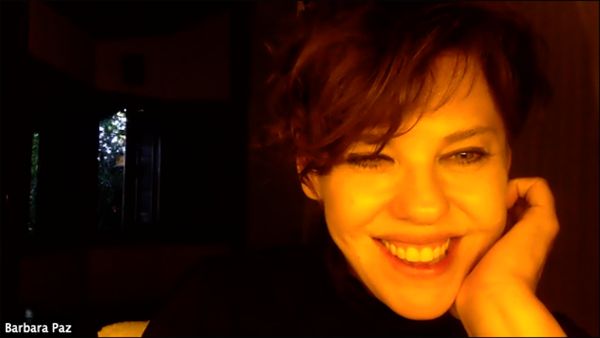In Babenco: Tell Me When I Die (winner of the 2019 Venezia Classici Award for Best Documentary on Cinema), Bárbara Paz’ outstanding tribute to her late husband Héctor Babenco (who died on July 13, 2016 at the age of 70), she inventively connects personal footage with clips from his films to create a seamless cinematic celebration that is thought-provoking and poetic. His adaptation of Manuel Puig's Kiss Of The Spider Woman, screenplay Leonard Schrader, starring Raúl Juliá, William Hurt and Sônia Braga (with clothes made by her mother), received four Oscar nominations - Best Picture, Best Director, Best Adapted Screenplay with Hurt winning Best Actor.
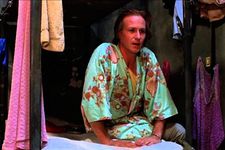 |
| William Hurt won an Oscar, BAFTA, and in Cannes for his performance in Héctor Babenco’s Kiss Of The Spider Woman |
Tom Waits was in two of Babenco's films, William Kennedy's Ironweed, starring Jack Nicholson and Meryl Streep (both Oscar nominated) and the adaptation of Peter Matthiessen's At Play in the Fields of the Lord, screenplay by Babenco, Jean-Claude Carrière and Vincent Patrick, starring Tom Berenger, John Lithgow, Daryl Hannah, Aidan Quinn and Kathy Bates.
Pixote: A Lei Do Mais Fraco, screenplay Babenco and Jorge Durán, based on José Louzeiro's book The Childhood Of The Dead Ones won the Silver Leopard at Locarno in 1981. Nick Cave and the Bad Seeds dedicated their album Tender Prey to Fernando Ramos da Silva (Pixote) who was killed at the age of nineteen in 1987. Héctor Babenco's final film, My Hindu Friend (Meu Amigo Hindu) in 2015, stars Willem Dafoe as a director whose health is failing, and features a glorious Singin’ In The Rain performance from Bárbara Paz.
Brazil’s Oscar submission, Babenco: Tell Me When I Die, co-written with Maria Camargo, is also eligible for Best Documentary Feature Oscar consideration. Audiences with varying degrees of familiarity with Babenco’s work can discover the spellbinding force of cinema and a magic larger than life where rain and fire are friends.
On the afternoon of a huge snowstorm in New York City, Bárbara Paz joined me on Zoom from São Paulo for a conversation on Héctor Babenco’s life and work and the mysteries of her film. We ended up dancing and swimming with Fred Astaire and Giulietta Masina, David Lynch and Ingmar Bergman, Roman Polanski’s take on Leopold von Sacher-Masoch’s Venus In Fur(s), Joan Didion and Pina Bausch, Gene Kelly and Claude Lelouch, Lucy and Bruno Barreto, Julian Schnabel, and the many incarnations of Willem Dafoe. Juliana Sakae was on hand to help us out with translating from and into Portuguese.
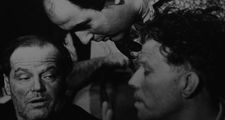 |
| Héctor Babenco on the set of Ironweed with Jack Nicholson and Tom Waits |
Anne-Katrin Titze: First of all, congratulations! Your film is very impressive.
Bárbara Paz: Thank you!
AKT: You decided to make the beginning mysterious. We hear your late husband’s voice, he is talking about lions and the phoenix returning and not really dying. Then we get a close-up of his ear - which reminded me of David Lynch. Then come scenes of people running. Can you talk a bit about this beginning, the mystery that you wanted to set up?
BP: First of all, thank you, you understand everything! I take it as a compliment that you compare it to David Lynch, he’s the master. David Lynch, he works a lot with the subconscious. Maybe, thinking of David Lynch, I also wanted to work through the subconscious. Héctor was a storyteller. He was a man always fighting against death. So the beginning of the film I wanted to be like a rewinding of a tape.
AKT: Oh that’s interesting!
 |
| Bárbara Paz on Mr. Babenco: “That’s why I had to write this book to include so many of his beautiful sentences. He was a great thinker.” |
BP: I worked so hard on the audio of the film and the sensations and the feelings. This mix of all the voices you are hearing is what was happening in his last days. I think I began the film at the end.
AKT: Because you mention sounds - I loved the sounds at the very end because we don’t know if it’s rain or if it’s fire, the sound is both. That’s him, Héctor, in a way, isn’t it?
BP: In my mind was fire. There is a reference to ashes, so probably his passing. But it could be rain. Because I kept dancing in the rain for him.
AKT: I want to talk about that beautiful scene in a second. But before that, you mentioned that he is a storyteller. There is a great quote in the film: “You have to know how to tell a story. For that you have to live.” That made me think of Joan Didion who wrote “We tell ourselves stories in order to live.”
BP: I know of Joan Didion, I love her, but I don’t think it came from there. That just came out of Héctor’s mouth like so many other powerful and beautiful sentences. That’s why I had to write this book [Mr. Babenco] to include so many of his beautiful sentences. He was a great thinker. He didn’t mention Joan Didion literally but maybe his subconscious had it in the back of his mind. Can you repeat the sentence?
AKT: “We tell ourselves stories in order to live.”
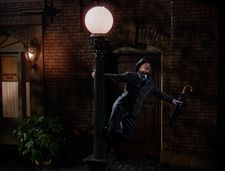 |
| Gene Kelly in Stanley Donen’s Singin' In The Rain |
BP: He said something along the lines that he would tell the story in order to forget it.
AKT: Exactly. They are like sibling sentences. That is what I find so fascinating about his films and your film - things that you might think are contradictory, are actually not. They are both. In scenes of running [groups of boys into the sea, William Hurt in Kiss of the Spider Woman, Pixote], the running is both away from something and towards something [the camera, the ocean].
BP: True, keep going!
AKT: Héctor says “There is a great difference between the first movie and the movie we take to heart.”
BP: I love this part!
AKT: It’s wonderful. It’s funny, during that scene, I thought about which movie came to my heart and the first film that popped into my head was [Mark Sandrich’s] Top Hat with Fred Astaire and Ginger Rogers. And then, miraculously, twice in your film you have the song from Top Hat: “Heaven, I’m in heaven” we hear from the [Irving Berlin] song Cheek to Cheek [first sung by Héctor, later by Willem Dafoe]. I could hardly believe it.
BP: Really? Before the scene?
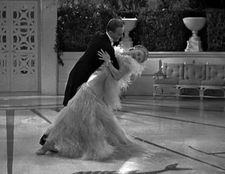 |
| Fred Astaire and Ginger Rogers Dancing Cheek To Cheek in Top Hat |
AKT: Yes, that was in my head. My question to you: what was the first film that went to your heart?
BP: Nights of Cabiria. I think that was the first. Fellini. Giulietta Masina. Just one?
AKT: No, I want more!
BP: My background is in theatre. Bergman for me was important. Persona is an incredible film for me, because Bergman is a director of theatre. I think Bergman and Héctor Babenco are similar; somewhere they meet. Héctor made 11 films and Bergman maybe more than 100, but they are both somehow like an orchestra conductor. They meet somewhere in that sense.
AKT: I can see a bit of Giulietta Masina in your Singin’ In The Rain dance!
BP: Thank you!! It’s an homage to her! But I never told anybody that.
AKT: Well, now it’s out there!
BP: Héctor loved my clown-side. Héctor’s last play was Venus in Fur, which Polanski also adapted for the screen for his wife [Emmanuelle Seigner]. And then Héctor directed me. It was a comedy and he really wanted to see my comedic side. It was the only comedy he ever directed. Ever.
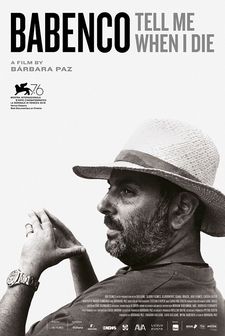 |
| Babenco: Tell Me When I Die poster |
AKT: It is based on the Leopold von Sacher-Masoch [who gave masochism its name] novella Venus in Furs, right?
BP: It’s also a Broadway show that won a lot of Tony awards. It’s humour on top of Sacher-Masoch. It’s a play inside a play. I was playing Venus in Fur.
AKT: I have seen the Polanski movie. Let’s talk about the Singin’ In The Rain scene. I see the clown side, the Giulietta Masina side. Then there is the absolutely life-affirming quality of Gene Kelly, of the Gene Kelly scene in his and Donen’s movie, which is life-affirming and safe. But when you dance, it’s not safe.
BP: Yes.
AKT: You see where I am going? There is death out there. Because of the lightning. Lightning could strike the tree you are hugging when you dance to the tree.
BP: Beautiful!
AKT: Again there is both - life and death.
BP: This is beautiful, thank you. That’s it! Both, life and death. Héctor knew this would be the last scene of his life, his cinema. He felt something and he knew. He asked me three days before to dance to Singin’ in the Rain. I was dancing more like a Pina Bausch-like dramatic dance and he woke up in the morning and said “You need to dance to Singin’ in the Rain! Because it’s the last scene in my life and cinema.”
AKT: So Pina Bausch was out of the picture?
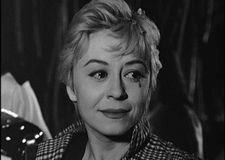 |
| Bárbara Paz on her Singin’ In The Rain dance and Giulietta Masina in Federico Fellini’s Nights Of Cabiria; “It’s an homage to her! But I never told anybody that.” |
BP: It’s in the beginning, mixed. I just did it two times, two takes.
AKT: It’s beautiful.
BP: Everybody cried because it’s a very magical moment. I don’t know what happened. But now I know why this happened. I know. It touches me.
AKT: It’s cinema at its best. It’s what cinema can do and only cinema can do.
Coming up - Bárbara Paz on Willem Dafoe, filming a private moment at Copacabana Beach for Babenco: Tell Me When I Die, the 1986 Oscar night for Kiss of the Spider Woman, Bruno Barreto, Lucy Barreto, and Luiz Carlos Barreto, a connection to the childhood cinema memories of Claude Lelouch, the images of Héctor Babenco’s adolescence and more.








